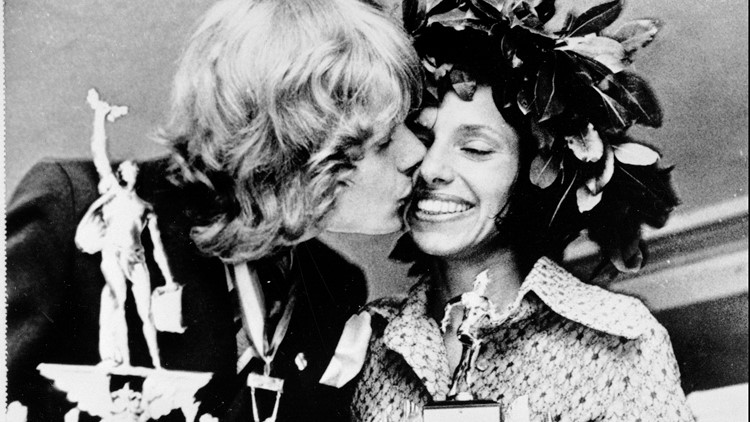BOSTON — Compared to what her predecessors faced a half-century before, an icy downpour and a near-gale headwind were minor obstacles for Des Linden on her way to a Boston Marathon victory.
The first women who dared to attempt the 26.2-mile run from Hopkinton to Boston's Back Bay faced sneers and catcalls, administrative roadblocks and even physical violence from an organization originally formed to encourage the pursuit of “manly sports.”
“I think about it, if I would be brave enough to do that. I’m not sure I would have been,” said Linden, who herself overcame some of the worst weather in the race's history to win in 2018. “But these guys stuck their neck out, and made it happen.”
Fifty years after eight women lined up alongside the men — the first official female entrants, but not the first ones to run the race — more than 12,000 women are entered in the Boston Marathon on Monday, when it returns to its traditional Patriots Day spot in the schedule for the first time since 2019.
The quasi anniversary will be marked by one of the strongest women’s fields ever, with reigning Olympic gold medalist Peres Jepchirchir, London and New York winner Joyciline Jepkosgei, and Ethiopia's Degitu Azimeraw all bringing personal bests under 2 hours, 18 minutes — two minutes faster than the Boston course record.
“Oh, my God, it’s so cool. I mean, like, that fires me up so much, just knowing the high level of competition we’re going to have here,” said Tokyo bronze medalist Molly Seidel, who along with Linden is one of the top American contenders. “It’s always fun to get to the race and just know that you’re up against the best in the world.”
Leading the men’s field is defending champion Benson Kipruto of Kenya, who in October won the first fall Boston Marathon ever after the 2020 race was canceled by the pandemic and the ’21 version was put off six months.
But this year, the attention is on the 50th anniversary of the first women's race, a milestone that is complicated by the thorny history of the distaff division.
Although women weren’t welcome until 1972, Bobbi Gibb is acknowledged as the first woman to run Boston, finishing it in 1966 among the unofficial runners known as bandits. A year later, Kathrine Switzer signed up as “K.V. Switzer” — there was no spot on the form for gender — and received an official bib; race director Jock Semple was so irate that he tried to shove her off the course.
“You can imagine how that must be challenging, where you are running and people don’t want to see you running,” said Mary Ngugi, who has campaigned against domestic abuse toward female athletes in Kenya.
“But now we can run, we can train, we can do whatever we want," she said. "We’ve been given these opportunities to feel like we are equal with the men. It’s amazing. Being here and being able to run, being able to be free and as a woman, it’s a great thing.”
Gibb’s three first-place finishes from 1966-68 and three for Sara Mae Berman from 1969-71 were originally considered the Boston Marathon's “Unofficial Era”; they have recently been upgraded in the record book to “Pioneer Era.”
But it is Nina Kuscsik’s 1972 victory that is celebrated this year.
“It sounds so outrageous to say that women are ‘allowed to run.’ That 50 years ago, ‘they finally let us be allowed to run,’” Switzer said. “But here we are.”
Valerie Rogosheske, who finished sixth in the ’72 race, will run again this year, along with her daughters, and also serve as the honorary starter for the women’s elite field. Five of the original eight women, including Switzer and Berman, are in town for the celebration.
As it has since first paying the winners in 1986, the Boston Athletic Association will award equal first prizes to the men's and women's winners — $150,000 apiece this year.
And the course will play no favorites, either.
“We do the same work,” Ngugi said. “The roads don’t care. We’ve still got the same hills.”



